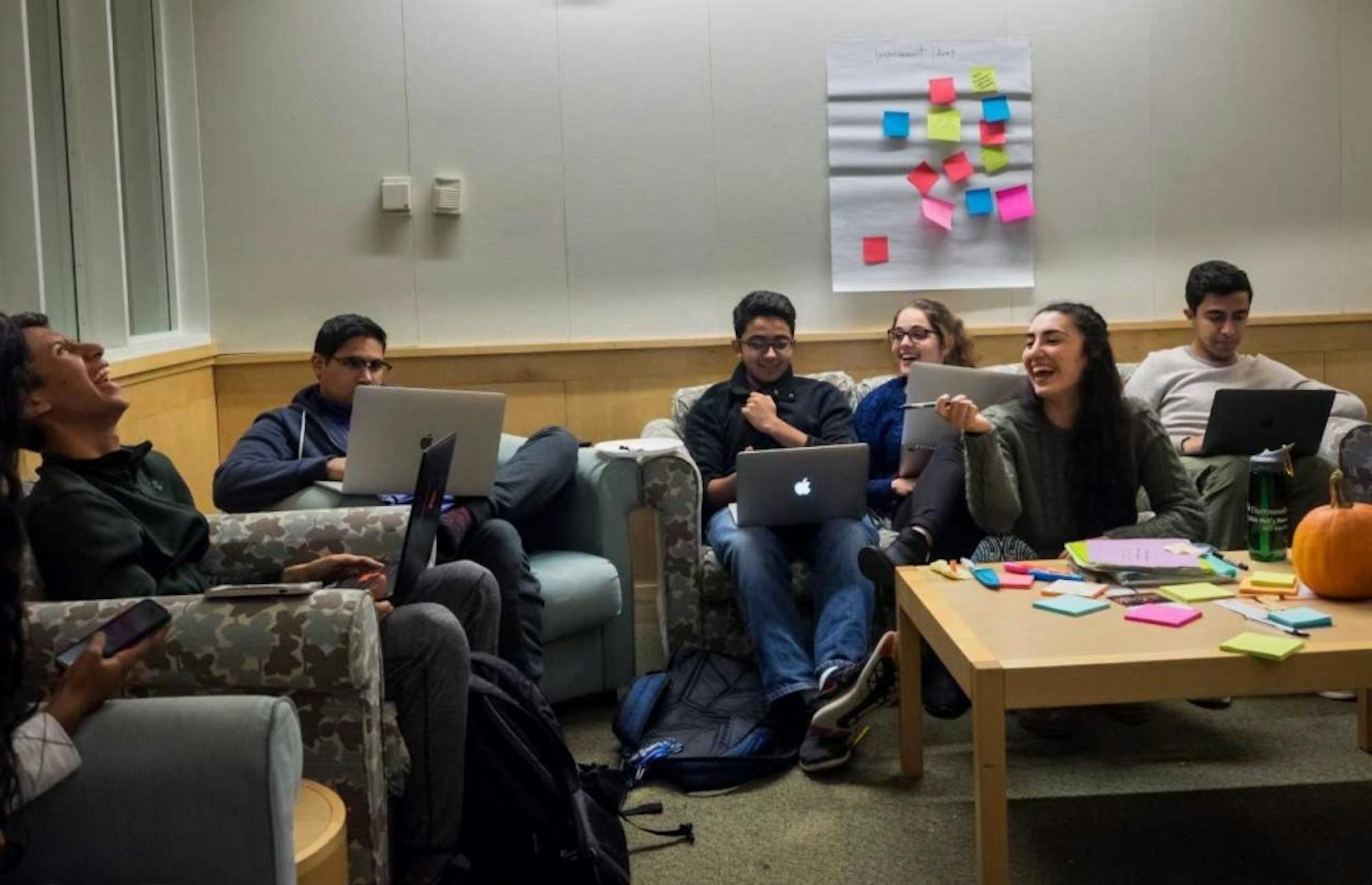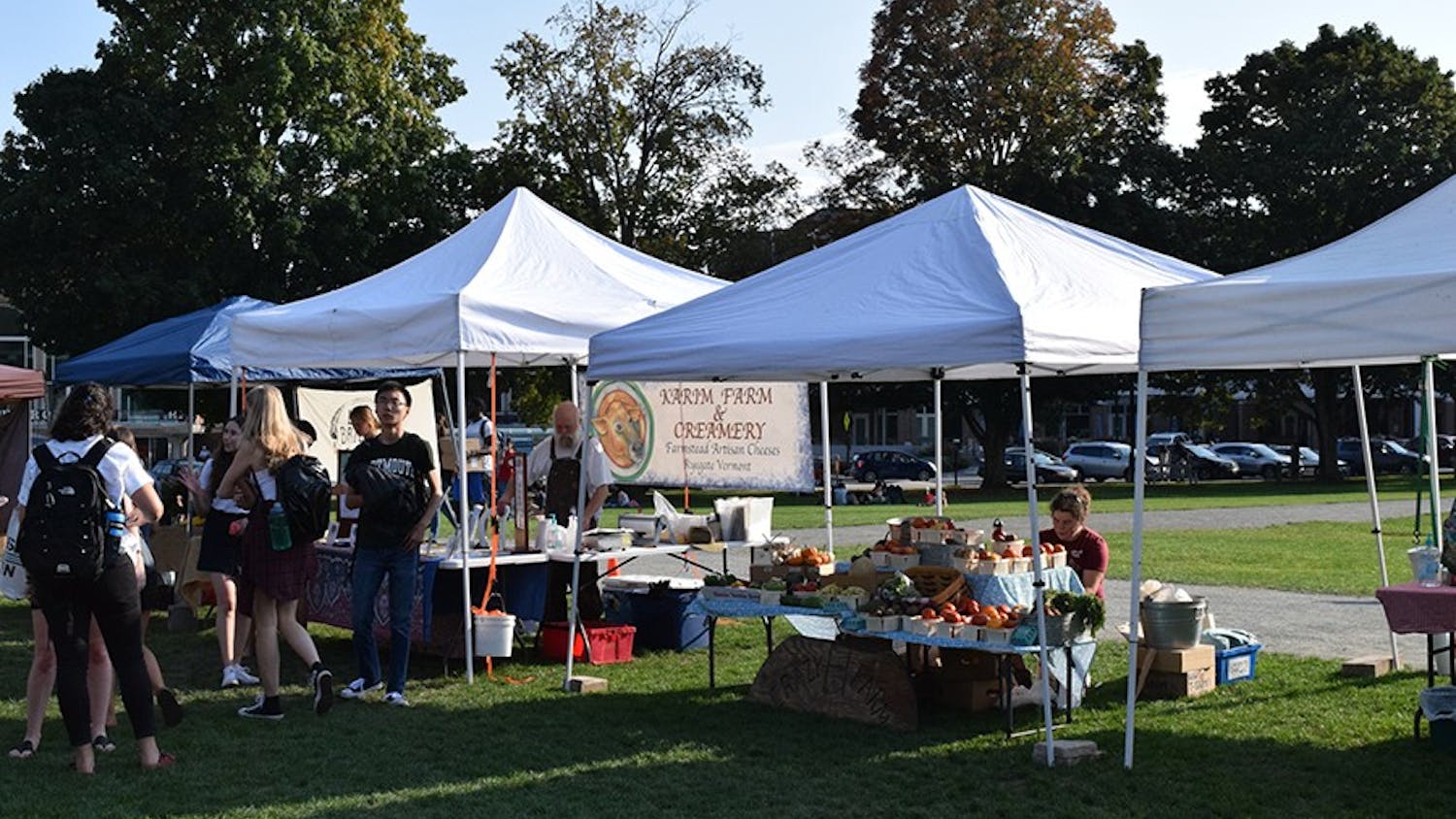“Social Media in the Age of Terrorism and Hate.” “How Social Relationships Affect our Relationship to Food.” “Should We Abolish Marriage?”
What do the above topics have in common? Anything?
Connecting social media and food seems easy enough: just think about the countless Instagram accounts dedicated to uploading appetizing food images. Add marriage to the mix — maybe someone is sharing a photo of a wedding cake? But then think about words like terrorism and social relationships, and finding a unifying thread becomes harder and harder.
Despite how different these three topics sound, they do share one important commonality: they are all previous topics of the Thought Project’s “Food for Thought” dinners.
The Thought Project is a Living Learning Community founded in fall 2015 by Julia Marino ’17 as part of the program allowing students to design their own Living Learning Community.
While perhaps best-known today for its frequent “Food for Thought” dinners, which are open to campus, the Thought Project had small beginnings.
After seeing a flyer on campus, Marino wrote her proposal for the Thought Project during her sophomore spring break, citing as motivation her desire to meet other students with similar interests in dialogue and discussion. As part of the proposal process, she had to find other interested students as well as a faculty advisor, the latter she found in Carl Thum from the Academic Skills Center.
After getting her proposal approved, the Thought Project began in the fall of 2015. Like any new organization, the Thought Project presented some initial challenges.
“When I was advertising the professor dinners, I did not really know how to frame the topic in such a way that people would really want to come,” Marino said. “I learned a lot in the first term in terms of how [to] build events that people are most interested in.”
Marino explained that it takes quite a bit of time for residents of a new Living Learning Community to get to know each other, but she believed she knew her floor well by the end of that first term. Since then, she’s had the opportunity to watch her original idea grow into what it is today — a group of 69 students governed by a complete student leadership team that hosts both open-to-campus and private events almost every week.
In fact, Marino said that when she was a student, she met some of her closest friends through the Thought Project. While she spoke very positively about the group’s organized events, she said that some of her favorite memories were much more spontaneous.
“I think that’s when we really started to form a deeper community,” Marino said. “Not necessarily through formal planned events, but through those impromptu conversations that happened when we were up late studying for a midterm or finishing a chapter of a thesis.”
Marino graduated from the College last year and now works in the Office of Residential Life as a program coordinator, so she still keeps an eye on the Thought Project, even meeting regularly with its UGAs.
Current resident Jessica Heine ’19 echoed Marino’s positive sentiments, adding some of her own favorite memories. Heine, who joined the Thought Project her freshman summer, served as social chair last year and co-led the LLC during her sophomore summer, mainly focusing on internal programming while another resident planned the “Food for Thought” dinners.
Reflecting on her experience, Heine said that she stuck around after her first term as a resident because of the provocative conversations that she didn’t find elsewhere at Dartmouth.
“It was the first place at Dartmouth where I felt like I had a community that shared a lot of the same values as me,” Heine said. “Not political or personal values, but just values in terms of caring about intellectual life and learning about new things.”
Heine elaborated on the sense of community she felt, listing activities like overnight cabin camping trips as especially effective community builders. She said that there was “just something” about going on a hike and staying in a cabin that helped bring people together, even when they did not know each other that well before the trip.
She also emphasized the diversity present in the Thought Project. She acknowledged that some students might view the Thought Project as a community only for people interested in deeply philosophical discussions, but refuted that belief, talking about the wide variety of perspectives represented by residents.
The Thought Project’s approach to advertising has also changed to attract a more diverse pool of applicants. A relatively recent development has been reaching out to various student groups to explain what the Thought Project is — especially freshmen-specific communities.
“We really made an effort to reach out to a larger Dartmouth community,” Heine said. “We were extremely homogeneous in the beginning, partly because [being] a ‘friend of a friend’ was the way most people decided to apply.”
Uma Ramesh ’20, another current resident who joined this past fall, lived in the Choates cluster her freshman year but didn’t grow close to many of her floormates, which she attributed to a lack of floor activities. Since joining the LLC, she’s been content with both how many new friends she’s made and how close she’s grown to those friends.
“I feel that at Dartmouth, it can be really easy to fall into a bubble where you [only] hang out with the people in your major or your department and have friends with the same extracurricular interests,” Ramesh said. “It can be hard to break out of that.”
Another aspect of the Thought Project that Ramesh has enjoyed has been its mentorship component. She recalled how last fall, the LLC received funding for gift cards to Morano Gelato so that students could meet new people over a tasty treat.
Although the Thought Project will not offer housing this summer because it does not have a standalone building, Ramesh hopes that members will still plan activities and spend time together.
In just a few years, the Thought Project has grown from a mere idea in one student’s head to a student-led haven for all kinds of intellectual discussions. Membership continues to grow, and with rave reviews from each person interviewed, the positive momentum doesn’t seem to be stopping anytime soon.
And in the future? Marino, who is headed to graduate school next year, expressed her desire to start a second branch of the LLC. The ultimate vision: to start a national chapter-based organization.
“I’m hopeful in the future that we could start chapters of the Thought Project at other schools,” Marino said. “Eventually it would be great if it could be on college campuses all over the country.”




